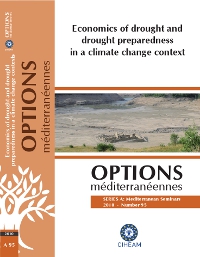| Article précédent | p. 49-55 | Article suivant |
Drought trends and impacts on agricultural production and natural resources in the context of climate change
According to the latest developments, the consequences of the climatic change in the Mediterranean Basin would be more severe compared to the world. It is expected that the global warming would be 1°C in 2025. In such a case, the temperatures would increase by 0.7-1.6°C in the Mediterranean Basin and the increase would even reach to 2°C in 20 to 50 years. Global climate change will hit the Mediterranean Region with a severe drought. It is seen that in the Mediterranean Basin, the precipitation had dropped by 20 percent over the past 25 years. The sea level will increase by 20-40 cm in 2050 and this will mostly affect Turkey. In Turkey, especially in arid and semi-arid regions such as the Mediterranean, Aegean and Central Anatolia regions, significant declines are foreseen in the precipitation levels. It can also be said that the most obvious reflections of climate to our daily lives are the unexpected weather events. Too much or too little rain at the wrong time and at the wrong place just summarizes the case. According to the report of Union of Turkish Agricultural Chambers, the total cost of the drought for the agricultural sector is estimated to be 2.5 billion €. Imports of agricultural products increased by up to 60 percent, with serious economic consequences. The water management and the agricultural policy have to be essentially revaluated while encouraging modern and efficient irrigation systems and defining correct crop patterns. Illegal water use must also be brought to an end. The impacts on natural resources have to be considered when water investments take place and they have to ground on integrated and sustainable water management. Long term and basin wise planning has to be done depending on the population, housing and industry projections in the cities. Within this planning context, climate change factor has to be play a key role and any risks should be anticipated ahead.
Selon les derniers travaux, le réchauffement climatique global atteindrait 1°C en 2025 et de 0,7 à 1,6°C dans le bassin méditerranéen. Cette augmentation atteindrait même 2°C dans 20 à 50 ans. Le changement global du climat frappera la région méditerranéenne d'une sécheresse sévère. D'ailleurs, les précipitations ont déjà diminué de 20 pour cent sur les 25 dernières années. Le niveau de la mer montera de 20 à 40 cm pour 2050 et ceci affectera fortement la Turquie où des baisses significatives des précipitations sont prévues dans les régions arides et semi-arides de la Méditerranée, de l'Égée et de l'Anatolie centrale. Le changement climatique entraînera des événements météorologiques inattendus Trop de pluie ou trop peu au mauvais moment et au mauvais endroit. Selon le rapport de l'Union des Chambres d'Agriculture de Turquie, le coût total de la sécheresse pour le secteur agricole est estimé à 2,5 milliards €. Les importations de produits agricoles pourraient augmenter de 60 pour cent, avec des conséquences économiques graves. La gestion de l'eau et la politique agricole doivent être essentiellement réévaluées tandis que seraient encouragés des systèmes modernes et efficaces d'irrigation et définis des modèles culturaux adéquats. Il faudra également cessé l'utilisation anti-réglementaire de l'eau. Les impacts sur les ressources naturelles doivent être considérés lorsqu'on investit dans le domaine de l'eau, en se fondant sur une gestion intégrée et durable de l'eau. Un aménagement à long terme concernant le bassin doit être mené en fonction de la population, et des projections de construction d'habitations et pour l'industrie dans les villes. Dans le cadre de ce contexte d'aménagement, le facteur changement climatique doit jouer un rôle clé et tout risque devrait être anticipé bien à l'avance.
- [ Afficher ]
- [ Télécharger ]
- [ Exporter la citation ]
Vous pouvez télécharger la citation au format :
- [ Imprimer ]
-
Mots-clés
AGRICULTURE, CHANGEMENT CLIMATIQUE, EVALUATION DE L'IMPACT, IMPACT SUR L'ENVIRONNEMENT, SECHERESSE, TEMPERATURE, TURQUIECiter cet article
Divrak B.B., Ayas C., Iş G. Drought trends and impacts on agricultural production and natural resources in the context of climate change. In : López-Francos A. (comp.), López-Francos A. (collab.). Economics of drought and drought preparedness in a climate change context. Zaragoza : CIHEAM / FAO / ICARDA / GDAR / CEIGRAM / MARM, 2010. p. 49-55. (Options Méditerranéennes : Série A. Séminaires Méditerranéens; n. 95). 2. International Conference on Drought Management, 2010/03/04-06, Istanbul (Turkey). http://om.ciheam.org/om/pdf/a95/00801324.pdf



